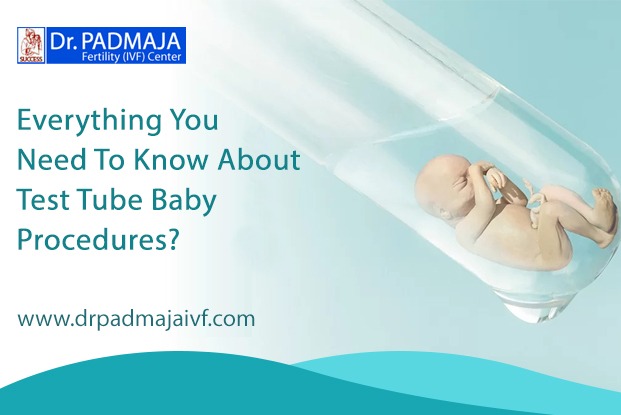In recent years, advances in reproductive technology have opened new doors for couples facing fertility challenges. One of the most well-known methods is the test tube baby procedure, also known as in vitro fertilization (IVF). This blog will guide you through everything you need to know about test tube baby procedures, especially focusing on the best IVF centers in Hyderabad, including Dr. Padmaja IVF Center.
What is a Test Tube Baby Procedure?
The term “test tube baby” refers to a baby conceived through IVF, a process where an egg is fertilized by sperm outside the body in a laboratory setting. After fertilization, the embryo is placed inside the woman’s uterus. This method has helped countless couples achieve their dream of parenthood, making it a popular choice for those struggling with infertility.
Why Consider IVF?
There are various reasons couples might consider IVF. Common factors include:
Age-related Infertility: Women over 35 may face challenges in conceiving naturally.
Blocked Fallopian Tubes: This condition can hinder the natural passage of eggs.
Endometriosis: This condition can affect the quality of eggs and the uterus.
Low Sperm Count or Motility: Male infertility can be a significant barrier.
Unexplained Infertility: Sometimes the reason for infertility is still a mystery.
If you’re experiencing any of these issues, consulting with a fertility specialist at a leading IVF center, like the Dr. Padmaja IVF Center in Hyderabad, can provide you with the necessary insights and treatment options.
The IVF Process
Understanding the IVF process can help demystify it and alleviate concerns. Here’s a step-by-step breakdown:
1. Initial Consultation
Your journey begins with a consultation at a reputable IVF center, such as the Drpadmaja Fertility Center. During this visit, your doctor will review your medical history, conduct tests, and discuss potential treatment options tailored to your needs.
2. Ovarian Stimulation
Once you decide to proceed, you’ll undergo ovarian stimulation. Hormonal medications will encourage your ovaries to produce multiple eggs rather than the single egg that typically matures each month. Regular monitoring through blood tests and ultrasounds will help track the development of the follicles.
3. Egg Retrieval
When the eggs are ready, a technique known as “egg retrieval” is carried out. This is done under sedation, and a thin needle is guided through the vaginal wall to collect the eggs from the ovaries.
4. Sperm Collection
On the same day, a sperm sample is collected from the male partner or a sperm donor. This sample is prepared in the lab to select the healthiest sperm for fertilization.
5. Fertilization
The retrieved eggs are then mixed with the sperm in a laboratory. Conventional insemination or intracytoplasmic sperm injection (ICSI), in which a single sperm is injected straight into an egg, are two methods that can accomplish this.
6. Embryo Culture
The fertilized eggs, now embryos, are monitored for several days to ensure they develop properly. The embryologist will assess their quality and decide which embryos are best for transfer.
7. Embryo Transfer
Typically, 1 to 2 healthy embryos are selected for transfer into the woman’s uterus. This procedure is relatively simple and usually done without anesthesia.
8. Pregnancy Test
After about two weeks, a blood test is conducted to determine if implantation was successful and if you are pregnant.
Success Rates and Considerations
The success rates of IVF can vary based on several factors, including age, underlying fertility issues, and the quality of the embryos. It’s essential to discuss your specific case with your fertility specialist to understand your chances of success.
At the best IVF center in Hyderabad, like the Dr Padmaja IVF Center, experienced professionals can guide you through the process, offer personalized care, and help manage expectations.
Choosing the Right IVF Center
When selecting an IVF center, consider the following:
Expertise: Look for centers with experienced doctors and successful track records.
Facilities: Modern and well-equipped labs are crucial for high success rates.
Support Services: Emotional and psychological support can be an essential part of the IVF journey.
Patient Reviews: Testimonials from previous patients can provide insight into their experiences.
The Drpadmaja Fertility Center is renowned for its patient-centric approach, cutting-edge technology, and highly skilled staff, making it a leading choice for many couples in Hyderabad.
Conclusion The test tube baby procedure offers hope to many couples facing infertility challenges. With the support of experienced professionals at a reputable IVF center, such as the Dr Padmaja IVF Center in Hyderabad, the journey toward parenthood can become a reality. If you’re considering IVF, take the first step by consulting a fertility specialist to discuss your options and embark on this transformative journey. Remember, you’re not alone—support and expertise are available to help guide you every step of the way.
About The Author :

If Dr. Padmaja Divakar is a public figure or a professional in a specific field, I recommend checking her official website, professional profiles, or reliable online sources for the most up-to-date and accurate information about her background, qualifications, and achievements.
Frequently Asked Questions (faqs
1. Who is a candidate for IVF?
IVF may be recommended for couples facing various fertility issues, including:
Blocked or damaged Fallopian tubes
Endometriosis
Male factor infertility
Unexplained infertility
Genetic disorder
2. What are the success rates of IVF?
Success rates can vary based on factors like age, cause of infertility, and specific clinic protocols. Generally, younger women have higher success rates
3. Is IVF safe?
IVF is generally safe, but like any medical procedure, it carries some risks, including:
Ovarian hyperstimulation syndrome (OHSS)
Multiple pregnancies
Ectopic pregnancy
4. How many cycles of IVF can a person have?
There’s no strict limit, but it often depends on individual circumstances, including health and financial considerations. Many couples undergo multiple cycles to increase their chances of success.
5. What are the costs associated with IVF?
Costs can vary widely depending on the clinic, geographic location, and specific treatment plans. It may include medications, lab fees, and procedure costs. Insurance coverage varies as well.

